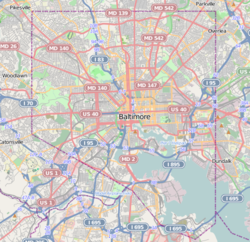Little Bohemia (Baltimore, Maryland)
|
East Monument Historic District
|
|

Row homes in East Monument Historic District, June 2014.
|
|
| Location | Bounded by N. Washington St. on the W; Amtrak rail line on the N. to E. St.; S. to Monument and E to Highland Ave., Baltimore, Maryland |
|---|---|
| Coordinates | 39°18′02″N 76°34′48″W / 39.30056°N 76.58000°WCoordinates: 39°18′02″N 76°34′48″W / 39.30056°N 76.58000°W |
| Area | 328 acres (133 ha) |
| Architect | Novak & Hurt, Novak, Frank, et al.; Gallagher, Edward J., et al. |
| Architectural style | Italianate, Queen Anne, Classical revival |
| NRHP reference # | 09001061 |
| Added to NRHP | December 8, 2009 |
East Monument Historic District (also known as B-5162) is a national historic district in Baltimore, Maryland, United States. It is a large residential area with a commercial area located along East Monument Street. It comprises approximately 88 whole and partial blocks. The residential area is composed primarily of row-houses that were developed, beginning in the 1870s, as housing for Baltimore's growing Bohemian (Czech) immigrant community. Most of the homes in the district were created after older homes were demolished in order to make room for expansions to the Johns Hopkins Hospital. During the late 19th and early 20th centuries the neighborhood was the heart of the Bohemian community in Baltimore. The Bohemian National Parish of the Roman Catholic Church, St. Wenceslaus, is located in the neighborhood.
During the late 1800s and early 1900s, the neighborhood was known colloquially as Little Bohemia or Bohemia Village.
By 1969, the Czech-American community in Little Bohemia was predominantly composed of ageing homeowners who lived alongside more recently arrived African-American residents. However, many of the older white Czech-Americans harbored racist attitudes towards black people. According to a reporter with 'The Baltimore Sun', "The older people of Bohemian extraction still live in the houses they own...but they share the neighborhood with black people whom they do not seem to appreciate or understand." This was the last generation of Czech-Americans to remain in Little Bohemia in large numbers, with the neighborhood transitioning into a predominantly African-American neighborhood by the 1970s and 1980s.
It was added to the National Register of Historic Places on December 8, 2009.
...
Wikipedia



